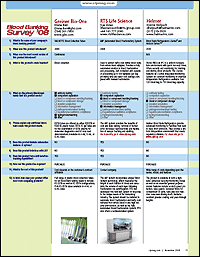
At the same time that I was encouraging Patrick to think about backup plans, we at CLP began putting together our Inside Track interview on Sakura Finetek. Sakura’s vice president of marketing and sales and customer relations discussed how his company designed a backup plan for its instruments called failure mode analysis. If anything goes wrong with the machinery in Sakura’s tissue processor, there are actions the system takes to ensure that the tissue is not damaged. Be sure to read the interview with Gilles Lefebvre on page 34.
In a sense, a new program developed by Quest Diagnostics is about having a Plan B as well. Recognizing that the clinical laboratory diagnostic field is undergoing major changes, Quest designed a solution to help laboratory professionals keep up with the ever-changing technological developments in the clinical laboratory. Quest is offering an alternative for overwhelmed laboratorians who are finding that with the increased demands on their time, their traditional ways of operating are no longer working and they need a Plan B. Find out more about Quest’s program on page 40.
One of my favorite radio personalities advises against having a Plan B. He says you decide on your Plan A and then “you ride that wagon until the wheels fall off!” Maybe when I have a successful television show and a movie career as he does, I’ll adopt that philosophy. Until that happens, I believe you should always have a Plan B.
Happy reading!
Carol Andrews
Editor
[email protected]


